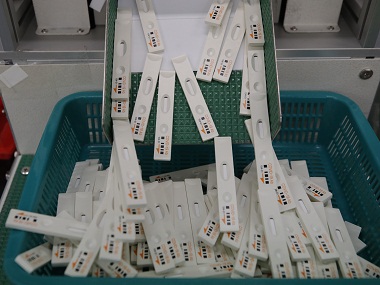The Indian Council of Medical Research (ICMR) was forced to recall the rapid antibody testing kits procured from China due to meager five percent accuracy rate of these kits. Meanwhile, China, among the leading manufacturer and exporter of these kits, blamed the handling by doctors, calling for better communication between Beijing and New Delhi. India had procured five lakh rapid antibody testing kits from two Chinese firms. However, the ICMR said they showed a wide variation in results, as against the assurances given by the manufacturers. “There are strict requirements for the storage, transportation and use of COVID-19 antibody rapid test kits. Any operation which is not carried out by professionals in accordance with the product specifications will lead to testing accuracy variations,” Counselor Ji Rong, spokesperson of the Chinese embassy in New Delhi, said. [caption id=“attachment_8317611” align=“alignleft” width=“380”]  Antibody test cartridges of the ichroma COVID-19 Ab testing kit. AP[/caption] With countries like South Korea, which fought the coronavirus outbreak successfully, advocating the importance of widespread virus screening, a testing vacuum may prove hazardous to India’s response to COVID-19. India reported 33,050 confirmed cases on Thursday. Additionally, a delay in the delivery of the kits, from the initial 5 April date to 10 April and then 15 April further cast a shadow on the mass testing strategy that India looked at deploying to stem the spread of coronavirus. Some reports attributed this delay to rumours that India’s share of kits were redirected to other countries by China. However, ICMR’s head of epidemiology and communicable disease Dr Raman R Gangakhedkar declined to comment on whether the kits were diverted to the US or other countries, according to Hindustan Times. China remains the largest manufacturer and exporter of protective equipment and testing kits, leaving many countries with no option but to rely on it as the coronavirus toll in many countries continues to climb. However, complaints against Chinese rapid antibody testing kits have been raised by countries other than India too, which claim that they do not meet the average 80 percent accuracy benchmark set by European Union Medicine Agency’s guidelines. Spain returned around six lakh kits manufactured by Shenzen Bioeasy Technology after they yielded an accuracy rate of 30 percent, while Britain is seeking a $20 million refund from China after rejecting the kits. The Czech Republic found the tests to be 20 percent accurate, while authorities in Phillippines and Turkey pegged the figures at 40 percent and 35 percent respectively. Hitting out at China, from whom Slovakia had purchased 1.2 million testkits, Prime Minister Igor Matovic said, “We have a ton and no use for them,” adding that they should “be thrown straight into the Danube”. Shrugging off responsibility like it did in the face of complaints of India, China held Slovakia responsible for the handling of the kits leading to their inefficiency. “Problems should be properly solved based on facts, not political interpretations,” Foreign Ministry spokeswoman Hua Chunying said. Additionally, President Xi Jinping described China’s mass deployment of medical assistance to countries including Italy, Greece and France as an effort to further a “Health Silk Road”. Reports claim that over 100 Chinese companies are selling coronavirus testing kits to Europe, but most are not licensed to sell in China, according to India Today. Beijing, however, pledged to improve its crackdown on faulty medical products. A Ministry of Commerce statement said that coronavirus test kits, medical masks, protective clothing, ventilators and infrared thermometers will need to prove they’re certified in China and promise their products also meet the quality standards of the importing nation, according to Bloomberg. Amid questions regarding the quality and delay in supply of kits by China, tapping other sources for these kits assumes importance given the need for reliable testing to curb the spread of the virus. Union Health Minister Dr Harsh Vardhan said on Tuesday that India will achieve self-reliance with respect to the production of indigenous rapid testing and RT-PCR diagnostic kits by the end of May. Looking at other options to procure rapid testing kits, New Delhi has ordered a first batch from South Korea, and more kits will be procured from Germany, Canada and Japan, according to India Today. The consignments of at least five lakh kits is expected to arrive from South Korea’s Humasis Ltd in four batches starting 30 April, a News18 report said. The Indian firms – Gujarat-based Voxtur Bio, Delhi-based Vanguard Diagnostics and the government-owned HLL Lifecare – have been approved for supplying test kits. HLL plans to manufacture two million kits by 30 May, a report in Hindustan Times claims. The other two firms depend on China for some components to manufacture these kits and an embargo on exports of these components has left their operations in limbo. Additionally, South Korea-based SD Biosensor set up a subsidiary in Haryana’s Manesar with a capacity to produce five million kits, with the aim to scale up production, according to a statement from the Embassy of India in South Korea’s capital Seoul. It is working on an order of 1 lakh testing kits, the manufacturing plant head told ANI. A rapid test kit determines whether a person has developed antibodies in their blood stream to fight COVID-19 and has been recommended for surveillance testing. Unlike RT-PCR tests, whose results take around five hours, rapid test kits show results within 30 minutes. The ICMR has recommended using these in containment zones, large migration gathering and evacuee centres. It has also said that a RT-PCR test is necessary to validate a negative rapid test kit result.
Amid questions regarding the quality and delay in supply of kits by China, tapping other sources for these kits assumes importance given the need for reliable testing undertaken after rigorous review of the equipment.
Advertisement
End of Article


)

)
)
)
)
)
)
)
)



